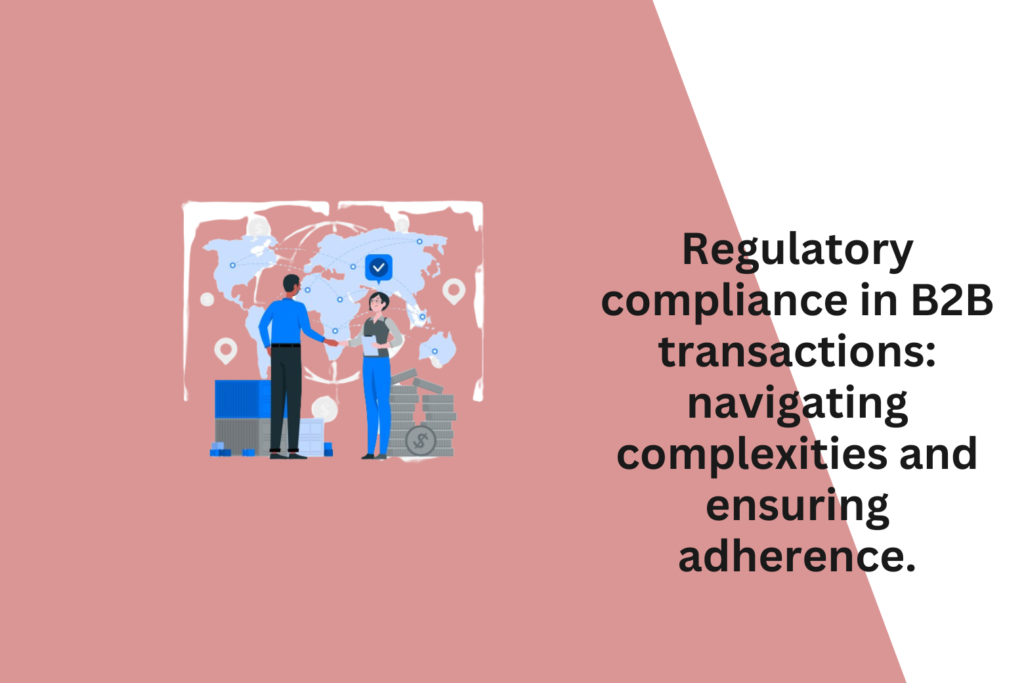
Regulatory compliance is a critical aspect of B2B (business-to-business) transactions, ensuring that businesses operate within legal frameworks, adhere to industry standards, and fulfill obligations. Navigating the complexities of regulatory compliance in B2B transactions involves a thorough understanding of relevant laws, industry regulations, and ethical considerations. Here’s a guide on how businesses can ensure adherence to regulatory requirements:
1. Understand Applicable Laws and Regulations:
Industry-Specific Regulations:
- Identify and understand industry-specific regulations that govern B2B transactions. Different industries may have specific compliance requirements related to data protection, safety standards, and contractual obligations.
Data Protection Laws:
- Be aware of data protection and privacy laws, especially when dealing with sensitive information. For example, the General Data Protection Regulation (GDPR) in the European Union imposes strict rules on the processing and transfer of personal data.
Anti-Bribery and Corruption Laws:
- Familiarize yourself with anti-bribery and corruption laws, such as the Foreign Corrupt Practices Act (FCPA) in the United States. Implement measures to prevent bribery and corruption in B2B transactions, including due diligence on business partners.
2. Implement Robust Contractual Practices:
Clearly Define Terms and Conditions:
- Ensure that contracts clearly define the terms and conditions of the B2B transaction. This includes pricing, delivery terms, payment terms, and any other relevant details. Clarity in contracts helps prevent disputes and ensures mutual understanding.
Compliance with Local Laws:
- Incorporate clauses in contracts that address compliance with local laws and regulations. This may include provisions related to product safety standards, environmental regulations, and other legal requirements specific to the region.
Intellectual Property Protection:
- Address intellectual property rights in contracts to protect both parties. Clearly outline ownership of intellectual property, confidentiality provisions, and any licensing arrangements to avoid legal complications.
3. Conduct Due Diligence on Business Partners:
Supplier and Vendor Due Diligence:
- Before entering into B2B transactions, conduct due diligence on suppliers, vendors, and business partners. Verify their legal standing, reputation, and compliance with relevant regulations to mitigate risks associated with non-compliance.
Third-Party Risk Management:
- Implement a robust third-party risk management program. Regularly assess and monitor the compliance practices of third parties, including suppliers, distributors, and agents, to ensure ongoing adherence to regulations.
4. Data Security and Privacy Compliance:
Data Encryption and Protection:
- Implement data encryption and protection measures to safeguard sensitive information. This is crucial for compliance with data protection laws and for maintaining the confidentiality and integrity of data in B2B transactions.
Data Transfer Compliance:
- When engaging in international B2B transactions, be mindful of data transfer regulations. Ensure that data is transferred in compliance with applicable laws, and consider mechanisms such as Standard Contractual Clauses (SCCs) for cross-border data transfers.
5. Internal Policies and Training:
Employee Training:
- Provide regular training to employees on relevant compliance requirements. Ensure that staff members involved in B2B transactions are aware of their responsibilities and the legal frameworks that govern their activities.
Internal Audits:
- Conduct internal audits to assess and monitor compliance practices. Regular audits help identify areas of improvement, ensure ongoing adherence to regulations, and demonstrate a commitment to ethical business practices.
6. Engage Legal Counsel:
Legal Review of Contracts:
- Engage legal counsel to review and draft contracts to ensure compliance with applicable laws and regulations. Legal professionals can provide guidance on industry-specific requirements and help mitigate legal risks.
Regulatory Updates:
- Stay informed about changes in regulations by regularly consulting legal counsel and monitoring updates from regulatory authorities. Adapt business practices to align with new requirements and maintain a proactive approach to compliance.
7. Ethical Business Practices:
- Corporate Social Responsibility (CSR):
- Embrace corporate social responsibility and ethical business practices. Demonstrate a commitment to sustainability, environmental stewardship, and social responsibility, which can positively



